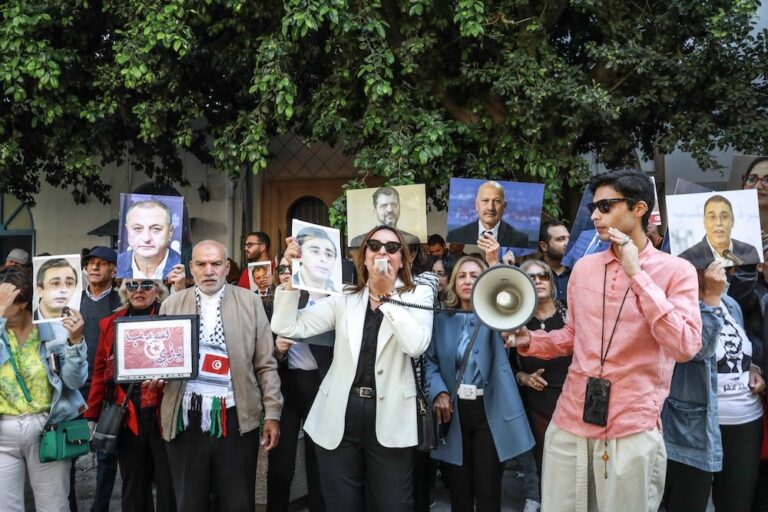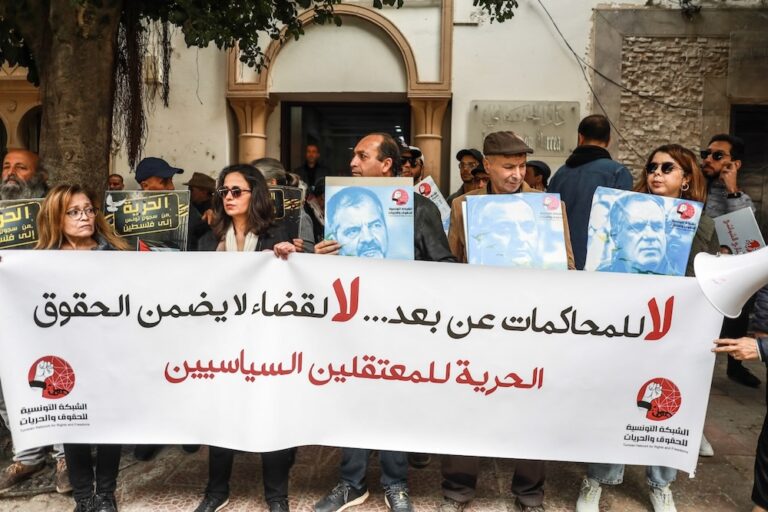Ahead of the first ever democratic elections in the country, IFEX-TMG members encourage a swift, fair and transparent broadcast licencing process.
(IFEX-TMG) – 10 May 2011 – Decades of government-imposed restrictions on freedom of speech and freedom of media through censorship, imprisonments, and pressure on media outlets and journalists have left the Tunisian media landscape in urgent need of reform, with the promotion of freedom of expression as a founding cornerstone, say members of the International Freedom of Expression Exchange Tunisia Monitoring Group (IFEX-TMG), a coalition of 20 IFEX members.
It is against this backdrop that the National Authority to Reform Information and Communication (l’Instance nationale pour la réforme de l’information et de la communication, INRIC) is responsible for developing guidelines and standards on licensing of broadcasters, consistent with Tunisia’s ambition to be a regional leader in terms of media freedoms.
“ARTICLE 19, the World Association of Community Radio Broadcasters (AMARC) and other members of the IFEX-TMG express their support to INRIC in its difficult task. Ahead of the first ever democratic elections in the country, we urge the institution to develop a swift, fair and transparent licensing process, free of all pressures, and binding to any new applicant in Tunisia, in line with a genuine democratic transition,” says Dr. Agnès Callamard, ARTICLE 19 Executive Director.
In particular, we are calling for these key recommendations to be respected:
• The airwaves are a public resource and they must be used for the benefit of the whole public, including people with minority views or interests. In particular, licences should be issued to all three tiers of broadcasting (public, commercial and community), the two types of broadcasters (radio and television) and broadcasters of different geographic reach (national, regional and local).
• All licensing processes and decisions should be overseen by an independent regulatory body which shall enjoy operational and administrative autonomy from any other person or entity. It should in particular be protected against interference, particularly of a governmental, political or commercial nature.
• The process for obtaining a broadcasting licence, including temporary ones, should be fair and transparent, include clear time limits within which decisions must be made and allow for effective public input and an opportunity for the applicant to be heard.
• The assessment criteria should, as far as possible, be objective in nature. They should reflect the diversity of the population, prevent undue concentration of ownership, as well as include an assessment of the financial and technical capacity of the applicant. Any decision to refuse a license should be accompanied by written reasons and should be subject to judicial review.
• Where licensees also need a broadcasting frequency, they should not have to go through a separate decision-making process to obtain this frequency; successful applicants should be guaranteed a frequency appropriate to their broadcasting licence and they should be free to make their own arrangements for transmission, subject to complying with general technical standards.
• Given the Tunisian environment and the well understood thirst for expression and communication, as demonstrated by the requests for radio licensing coming from many sides of society, demands for radio licences should be treated as a matter of priority, ahead of the constitutional elections and of the assessment of TV licences.
We, IFEX-TMG members, believe that implementing these recommendations would greatly strengthen Tunisia’s democratic credentials and set an important example for the region. We call on all members of the government, political parties, media and civil society to support and promote the move towards establishing a fair and transparent process for radio and TV licences.
For more on IFEX-TMG, visit http://ifex.org/tunisia/tmg/ or find IFEX-TMG at http://www.facebook.com/IFEXTMG and on Twitter @TunisiaMonitor
For more information and interviews in French, English and Arabic, please contact: Mona Samari, ARTICLE 19 Senior Media Officer, tel: +44 20 7324 2500; mona (@) article19.org
For ARTICLE 19’s Access to the Airwaves: Principles on Freedom of Expression and Broadcast Regulation, a set of guidelines developed based on international standards, comparative constitutional law and best practice in countries around the world, see http://www.article19.org/pdfs/standards/accessairwaves.pdf


